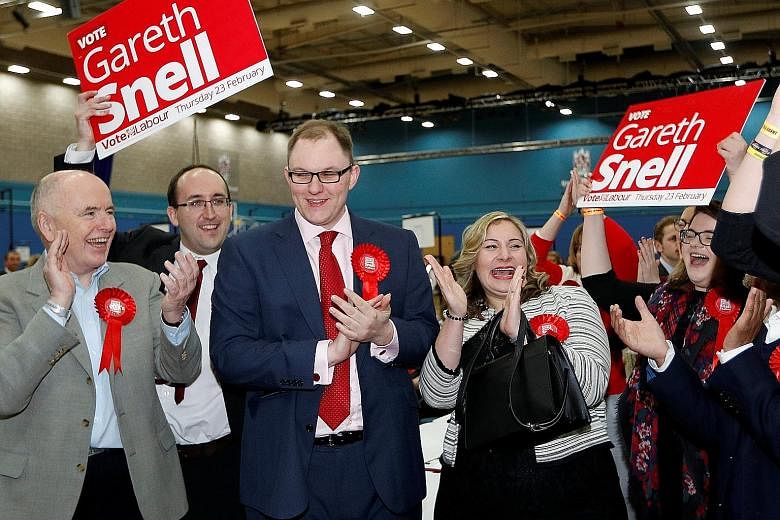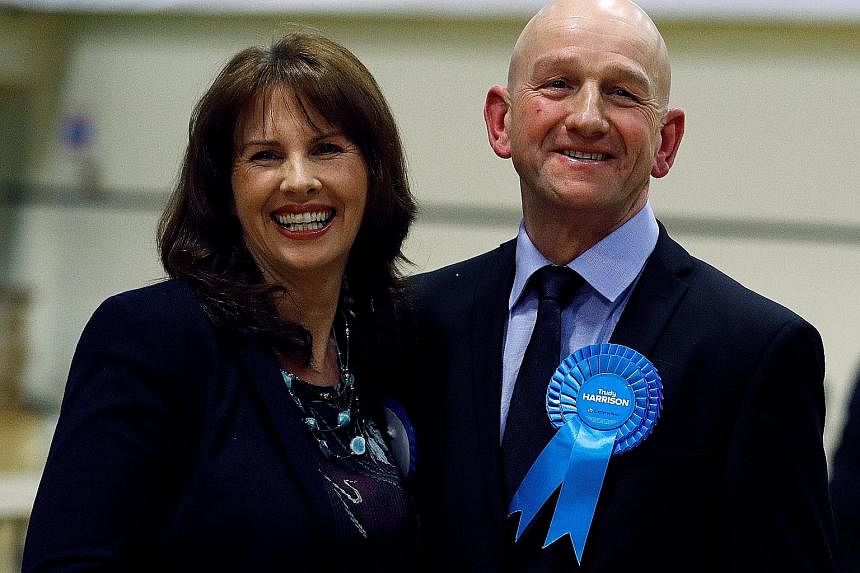British Prime Minister Theresa May has boosted her credibility after her Conservative Party captured a parliamentary seat from the opposition Labour in a by-election, the first time a ruling party in the country achieved such a feat since the early 1980s.
The loss of the seat is deeply humiliating for Labour's far-left leader, Mr Jeremy Corbyn, who faces renewed calls for his resignation. But Mr Corbyn may have saved his post for the moment, with a win for Labour in another by-election this week when it saw off a challenge from the UK Independence Party (Ukip), a nationalist, anti-immigrant movement.
Labour's electoral agony will, therefore, continue. It is strong enough to hold some of its existing core vote but not strong enough to gain power. And Prime Minister May's dominance over British political life remains unchallenged.
This week's by-elections were required because the sitting MPs - both Labour - quit, for jobs outside Parliament. Ostensibly, this was their personal choice. But in practice, the two, both widely respected, left because they could not see a future for their party under Mr Corbyn. So in essence, these by-elections were about Mr Corbyn's future.
Still, when campaigning started in January, Mr Corbyn had little cause to fear the outcome. The constituency of Copeland in north- west England has been solidly Labour for almost a century, while the other parliamentary seat, Stoke-on-Trent Central nestled in one of the most attractive mountainous areas in the heart of England, has voted Labour since 1950. Add to this the fact that governing parties seldom win by-elections, and Mr Corbyn was entitled to believe that he would prevail.
Yet not only did the Conservatives snatch the Copeland seat, they also did it by the biggest jump in the share of votes recorded by any governing party in a by-election in more than seven decades; when all the votes were counted yesterday, Mrs Trudy Harrison, the winning Conservative local MP and a working mother of four young children, rightly hailed the result as "a truly historic event".
Local factors played a part in Labour's defeat. Copeland's economy relies on the nearby nuclear reactors. The fact that Labour is now led by a man who opposes all nuclear activities destroyed the party's credibility in a constituency which is also near the dockyards where Britain is building its new nuclear-powered submarines.
Labour did better by holding on to Stoke-on-Trent, where it defeated a challenge from Ukip. The victory is made even sweeter by the fact that Ukip's candidate was none other than party leader Paul Nuttall; his failure to gain a seat is a severe setback for the anti-immigrant movement which, despite gaining 12.6 per cent of the vote at the last general election in 2015, has only one parliamentary seat.
Predictably glossing over his loss of Copeland, Mr Corbyn hailed his party's performance in Stoke-on-Trent as a national victory, "a decisive rejection of Ukip's politics of division and dishonesty". But the fact that he was boasting about holding a seat which should never have been under threat is in itself an indication of just how low Labour's electoral expectations have sunk.
More significantly, the by-elections indicate that Mr Corbyn, an old party operative who lives in an expensive suburb of the British capital, holds no attraction for core Labour voters, who are largely concentrated in the working-class central and northern regions.
And that is catastrophic, for Labour has already lost almost all the 50-odd parliamentary seats it used to control in Scotland. If it loses its northern England constituencies too, it will have no chance of ever forming a government.
The chief beneficiary of all this is Prime Minister May. When she meets Mr Corbyn in Parliament next week, she would have to fight hard to disguise her satisfaction.


